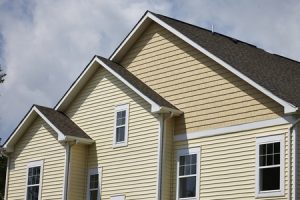 You probably don’t give a whole lot of attention to your home’s siding on a daily basis, but as the winter clouds clear and spring starts to push its way into the air, it’s a great time to inspect your siding and make plans for springtime renovations. While vinyls and other types of basic siding are popular, they also come with their downsides. You may want to consider switching to aluminum siding to help keep your home in optimal condition all year long.
You probably don’t give a whole lot of attention to your home’s siding on a daily basis, but as the winter clouds clear and spring starts to push its way into the air, it’s a great time to inspect your siding and make plans for springtime renovations. While vinyls and other types of basic siding are popular, they also come with their downsides. You may want to consider switching to aluminum siding to help keep your home in optimal condition all year long.
Common Siding Problems
Many older homes have wooden siding that is painted to look attractive, but wood isn’t known for its ability to withstand the elements of heat, rain, wind, and humidity. You may find that your wood siding is rotting and crumbling, which means it not only looks unattractive but also can’t protect your home efficiently. It’s exhausting to repair the rotted wood bit by bit, because as soon as you’re done fixing one section, the next section will fall into disrepair. It’s also possible that you will stumble across cracks and gaps in your siding. These holes let moisture and insects in, both of which will attack the wood frame of your house instantly.
The Benefits of Switching to Aluminum
Aluminum siding is an excellent alternative to the damage prone wood and vinyl found in most homes. Many people don’t realize that aluminum has such value in home construction as it does. It’s an incredible useful metal with unique properties that make it irreplaceable. First of all, aluminum’s insulating properties can improve the energy efficiency of your home and minimize your heating and cooling bills by giving your HVAC system a bit of a break. In addition, aluminum is totally resistant to the moisture, humidity, and salt air so commonly found in coastal and southern communities. Unlike so many materials that swell, rot, and grow mildew in those conditions, aluminum remains unchanged and undamaged.
But aluminum doesn’t only benefit those on the coast. It’s also perfect for colder northern communities that experience dramatically low temperatures each year. Unlike vinyl that can snap and crack in the cold, aluminum is not affected by chilly temperatures at all. If remaining environmentally conscious is important to you, then aluminum is an even better choice since it doesn’t require much energy to manufacture and can be remelted and remade into new objects instead of sitting in a landfill.
With countless colors, textures, and patterns from which to choose, you can customize the look of your home with aluminum and help to protect it indefinitely.


